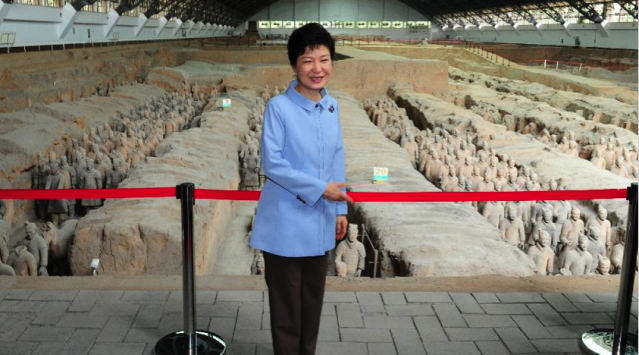by Roger Cavazos
11 July 2013
I. INTRODUCTION
In this Policy Forum Roger Cavazos explores the definition of ‘denuclearization’. He writes “Denuclearization must have some threads of national security, new power relationships, economics and climate change braided into the fabric. Pull any one of them too hard and the fabric is rent.”
Roger Cavazos is a Nautilus Institute Associate and retired US military intelligence officer.
The views expressed in this report do not necessarily reflect the official policy or position of the Nautilus Institute. Readers should note that Nautilus seeks a diversity of views and opinions on significant topics in order to identify common ground.
II. policy forum BY ROGER CAVAZOS
Defining denuclearization
President Park’s State Visit to China was filled with symbolism, rich with business and rode the Korean wave in a tremendous display of soft power. But what was actually accomplished to denuclearize North Korea? Almost all the press reports agree that “denuclearization” is a desired end-state. However, English, Korean and Chinese-language press offer contradictory assessments of who agreed to what. An inexhaustive survey of articles shows that “denuclearized” was not defined. Even North Korea, via Kim Kye-gwan’s statements in Beijing in June 2013, relayed a wish for denuclearization from North Korea’s thanatocratic leaders. So what does “denuclearized” mean?
President Park’s State visit had all the right symbols for both the host and the guest. She wielded personal charm by speaking to the Chinese people in their own tongue at Tsinghua, China’s top science and technology university. She strode deep into the heart of China, as it were, when she visited that spectacular homage of creativity and opulence to someone who unified a country. Surely it was an ideal spot for a leader of an unwhole state. South Korea’s soft power hallyu (韩流, 한류) or Korean Wave was an ideal wave for President Park to ride into China. Korean soap operas, actors and actresses with their formulaic yet desirable plots and appearances have tremendous audiences in China. Korea’s ability to generate wealth was also manifest in a 71 person strong business delegation. But security issues are not always a matter of dollars and sense.
Korea really blazed a new path by being the first in Northeast Asia to demonstrate that a country’s number one security partner does not have to be its number one trade partner. This divergence is a recent development which has become more common and fortunately, is rarely perceived of in zero-sum terms. Forcing countries to choose either a security partner or a commercial partner would represent an unstable arrangement and negative development for security.
But back to the original question, what does “denuclearized” mean? Denuclearization must have some threads of national security, new power relationships, economics and climate change braided into the fabric. Pull any one of them too hard and the fabric is rent.
The U.S. sees North Korea’s nuclear program as so much of a threat that the U.S. is going to spend over a billion dollars to defend against a likely non-existent threat of a North Korean nuclear-tipped missile. Dollars and sense do not always go together. But the U.S., Korea, Japan and others are making a strong case that if they perceive their national security is threatened, they will re-act. The U.S., Korean and Japanese re-actions run contrary to China’s national security interests. Denuclearization in a national security context probably means addressing North Korea’s capability and intent in a way that no longer draws reactions running counter to China’s national security.
A new great power relationship is unlikely to be successful if it is only based on an “anti” something platform. Lasting and defined great power relationships therefore should transcend specific issues. In this context, denuclearization means agreeing to a strategic framework rather than having to solve each individual issue which arises. As an example, no countries in Northeast Asia would really benefit from both South Korea and Japan developing a nuclear capability. For the U.S. it would represent a failure of extended deterrence and for China it would represent two more nuclear-capable (de facto not de jure) states on their doorstep in an already challenging neighborhood.
In economic terms, “denuclearized” if taken literally will likely kill a great number of jobs. Does “denuclearized” mean no power generated from a nuclear source? What does denuclearized mean for the various parts of the nuclear fuel cycle?
If nuclear energy is removed from the available sources of power, there will be some significant prices to pay in terms of drastically increasing the amount of carbon in the atmosphere since more fossil-fuels will be burned to create energy.
There are numerous other considerations. Fortunately, Mort Halperin has put forth a framework offering pragmatic and reversible steps to help define this goal “denuclearization” as one piece of a larger discussion set. Since all the countries have stated “denuclearization” as one of their goals, there is common ground.
President Park set the groundwork for bi-lateral and even tri-lateral cooperation with her visits to the U.S. and to China. Once even more common ground is created, via discussions, it is possible – even desirable – to invite in other parties. South Korea remains key to resolving issues on the Korean Peninsula and may even catalyze a new great power relationship.
III. NAUTILUS INVITES YOUR RESPONSES
The Nautilus Peace and Security Network invites your responses to this report. Please leave a comment below or send your response to: nautilus@nautilus.org. Comments will only be posted if they include the author’s name and affiliation.


